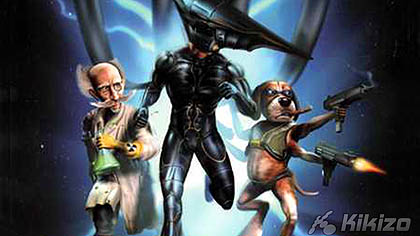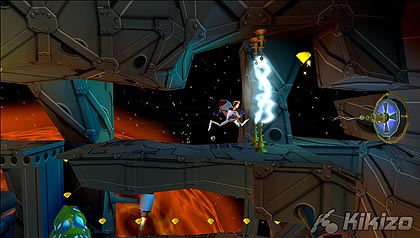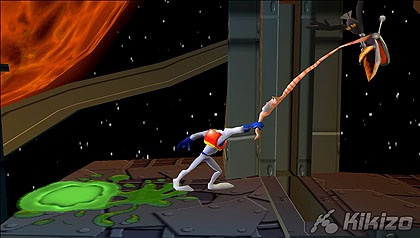Dave Perry: The Kikizo Interview
Huge interview with the games veteran and Acclaim CCO on California, cloud gaming, beast riding in Top Secret, MMOs success, Phil Harrison and Atari, returning to Earthworm Jim, and why a single console future will never happen.
Page 4
Kikizo: Who currently owns the Earthworm Jim rights? Is it something you could get back? And is it something you'd want to do if you could? Or, is it something you would prefer to leave in the past?
Perry: Well, that's a really good question. The way it worked was, while I was at Atari, I decided to rebuild the [EWJ] team, and get everyone back and make that Earthworm Jim game. So I called all the key players - and they're all busy, they've all got their own companies, everyone's writing movies or doing whatever they're doing - I called them all up and said: "I know you're all really busy, but let's be honest: wouldn't it be really fun to make another Earthwork Jim game?" And the rights are owned by Interplay, so I contacted Interplay, and they were willing to give us the rights; Atari was going to fund it. So everything was pretty much done. We even started to discuss what the game was going to be: our play was to make a game in the style of Batman, so what that means is when you see the new Batman, each new Batman can have a fresh new look at something, it doesn't have to be just the same, you know, continuing from where the last one left off. Just a different, fresh look at the same thing. We thought it would be fun to take a different look at it and just go crazy with it.
But Atari couldn't afford it. This was at a time when they started selling studios. And so they said, "we're sorry, we just can't afford to kick off another project right now," and so all the guys were like, "that's no problem - we've all got plenty of work to do!" and they all went back to their day jobs. It was a bit sad, because there was a lot of legwork done to get everyone on the same page. But anyway, the people at Interplay who own the rights to Earthworm Jim (because they bought them off me), they of course felt disappointed because they'd been getting all excited. Anyway, they've [now] singed some kind of deal with Doug Tennapel, who was lead animator on the [original] project, and he's probably mocking up some ideas for them. There was some announcement that went out that they've done a deal with Doug Tennapel, and it makes me think they're probably trying to get a pitch together so that they can get a game started.
Kikizo: You're not temped to go and sniff around that a little bit more to see if you can get involved?
Perry: No. No. I'm not really interested unless it's the full team, so... I don't really want to just... there's been other versions of Earthwork Jim done that were done without our permission really, licensing deals, and I was very unhappy about them.
Kikizo: How does it make you feel in hindsight though, about, selling your sort of - I don't know if you regard it as your 'original hit' but it's certainly what made you famous in the industry - Earthworm Jim? If you could go back, would you have sold it in the same way, or would you have put more conditions on the sale of the IP?
Perry: Yeah, I would never have sold it in the first place. The thing that people didn't understand at the time was that the industry was going 3D. And I was funding it personally, so I was funding everything out of my own bank account. And I was being asked on a constant basis, "can you buy a Silicon Graphics $25,000 computer, and oh, we need the software too, that's another $25,000..." - I was just writing checks left and right, trying to understand how we were going to move our company into 3D. And I was getting pushed back, because the team was a 2D team, that actually used pencils! So our skill - I think our secret to success - was that we had people who could draw with pencils, and draw fantastically, so that their animation was great. And to say to those guys: "put down your pencils, guys! We're going with 3D packages..." - packages that are horrible, by the way, because remember Version 1 of 3D Studio back then was dreadful. And they just were like, this is not something we're interested in doing.
So it was a difficult time. It wasn't an easy decision for me. It seemed smart to just get out, and not have to bet the farm on that, and it turned out to be the dumbest move ever. Because the team, the next game we made was MDK, which was a 3D game, and it just won awards everywhere. So suddenly, you know, we absolutely pulled off making 3D. So I was like: "Shit". [laughs]
Kikizo: One of those things...
Perry: Exactly, sometimes it makes sense at the time. It's just... who would know, right? It logically made sense at the time. That's why I did it. But you can't predict. You know, 3D at the time was just very difficult to do. It wasn't trivial at all. Nowadays, there are tonnes of experts at 3D so it's not a big deal. Back then, it was very scary for us! We had a programmer, who just turned out to be a programming god. He passed away - he's actually dead now - and he is a real loss to the industry. He was just somebody that you say "oh, we're going to have to go to 3D" - he just sits down and makes it happen. He's a real loss to the industry; he got cancer which is very sad. But at the time, I would have been super smart if I hadn't sold the rights. We all make mistakes.
Kikizo: We certainly do. Can we get an update on Top Secret? This is a multiplayer racing game, right?
Perry: Yeah, I thought I had pre-solved the problem... my goal was to see if the community could design a game that was something that I'd want to play, some kind of hook I'd never seen before, something really freaking fresh. Could the community do it? And I'd read some books on crowdsourcing and stuff, and they generally say they can't do it. "Mass equals mediocre", all that kind of stuff. So our experiment was, we signed a team in China, who has a racing engine. I expected - absolutely expected - them to come up with like a 'Mario Kart but on steroids'. We had a team waiting to start coding in China.
So we kicked the project off, and off it went, and the first thing that came out of them was, "we don't want to make that kind of a game; we want to make a beast-riding game, where you're riding the beast" - and they would have a card game that runs externally. They wanted to have crazy things like commentator mode so you can have people being real, live commentators - you know, "and now coming up on the fourth...!" - and I'm like, "What?! No one's going to want to do that!". But that's when you have to start opening your mind to more. There are so many crazy things I see... they're crazy, until you ask why, and how, and is that possible. It's usually surprisingly clever, and then you're like, why haven't we thought of that? Making commentators I think would add a lot to the experience. You've got races going, people have trained their beast, and built it up and put all their armour on it, they take it out, the guy's getting beaten up really bad, and the commentator's got his views on it. And then you rank the commentator at the end of the race, and the best commentators get to do the tournaments. So we went back to the Chinese developer and said, here's what we want to make, and they said, "we can't do that". So we cancelled it. Now we had no developer so we turned to this advisory board.
 Perry's team cracked the 3D gaming formula with MDK, but by then they'd lost the chance of revisiting EWJ
Perry's team cracked the 3D gaming formula with MDK, but by then they'd lost the chance of revisiting EWJOut of 32,000 people, I was trying to decide who should win. Like, who is the best. We had this ranking system, so you could vote for anyone who you thought was impressive. The number one guy, I called him up, this guy in England, his name's Paul, he worked for the National Healthcare Service. I said, "how out of 32,000 people did you pull this off, do you realise how impressive that is? That's like American Idol kind of stuff, you know, it's like impressive! I want to hire you - we'll work out what you're going to do, but I want to hire you", and I did - he still works for me. By doing that, I actually broke the voting system. It failed right away, because by hiring the top guy, what they all realised was that by voting for anybody, they voted themselves out of a job.
So the voting system crashed - basically I destroyed it, by hiring a guy right in front of them all. But the competition was still going on; this was not the winner of the competition, this was just... I was just impressed that this guy was doing so well. So what we did was we formed an advisory board, and the advisory board ran the project day to day. And they managed that ridiculous amount of work - thousands of bits of art and everything else. And the guy who clearly ending up winning is a guy called Mike Zummo, and he is now directing. He's directing three games for Acclaim right now in fact, which is killing him.







 Satoru Iwata Video Interview - the late Nintendo president spoke with Kikizo in 2004 as 'Nintendo Revolution' loomed.
Satoru Iwata Video Interview - the late Nintendo president spoke with Kikizo in 2004 as 'Nintendo Revolution' loomed. Kaz Hirai Video Interview - the first of Kikizo's interviews with the man who went on to become global head of Sony.
Kaz Hirai Video Interview - the first of Kikizo's interviews with the man who went on to become global head of Sony. Ed Fries Video Interview - one of Xbox's founders discusses an epic journey from Excel to Xbox.
Ed Fries Video Interview - one of Xbox's founders discusses an epic journey from Excel to Xbox. Yu Suzuki, the Kikizo Interview - we spend time with one of gaming's most revered creators.
Yu Suzuki, the Kikizo Interview - we spend time with one of gaming's most revered creators. Tetris - The Making of an Icon: Alexey Pajitnov and Henk Rogers reveal the fascinating story behind Tetris
Tetris - The Making of an Icon: Alexey Pajitnov and Henk Rogers reveal the fascinating story behind Tetris Rare founders, Chris and Tim Stamper - their only interview? Genuinely 'rare' sit down with founders of the legendary studio.
Rare founders, Chris and Tim Stamper - their only interview? Genuinely 'rare' sit down with founders of the legendary studio. The History of First-Person Shooters - a retrospective, from Maze War to Modern Warfare
The History of First-Person Shooters - a retrospective, from Maze War to Modern Warfare